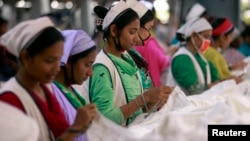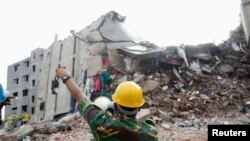SYDNEY —
Australian retail giant Kmart has reviewed its commercial ties with Bangladesh following this year’s factory collapse tragedy that killed more than 1,000 garment workers. The company has now started building safety checks and has pledged a zero tolerance for sweatshop conditions or slave labor.
Kmart runs a chain of about 170 discount clothes and multi-purpose stores across Australia and more than a dozen in New Zealand. It is independent from the American retail giant of the same name.
The company has developed close ties with garment manufacturers in Bangladesh that produce clothing and other goods for its stores. While it did not receive any clothing from the eight-story factory that collapsed in the capital, Dhaka, in April, Kmart has been under pressure from human rights groups and consumers to severe its relationship with unscrupulous operators who put workers in danger.
Kmart Australia's managing director, Guy Russo, says the retailer will not be abandoning Bangladesh, but after the Rana Plaza collapse, it is insisting it will not tolerate unsafe buildings, or work practices.
Russo concedes it took the Dhaka tragedy for his company to make structural building checks standard practice.
“To be quite honest, the thing that we weren't checking in our audits was building safety. I mean, we were doing all the other safety checks in regards to employment mainly," he said. "We refuse to do business with anybody that even considers to try to have a sweatshop or underage employees. But the one thing that we weren't doing were building checks and after this building had collapsed, I mean it touched me as much as it did every other Australian that has seen this terrible disaster. And, you know, I'm being honest, my team did not check buildings.”
Bangladeshi workers employed to produce garments for other western companies have often complained of long hours, poor wages and threats of intimidation if orders are not completed on time.
Some local factory owners have claimed that foreign retailers drive such a hard bargain over prices they cannot afford to ensure their buildings are safe.
However, newspaper reports suggest that some manufacturers have ignored advice to shut down unsafe garment plants, potentially putting thousands of lives at risk.
Last month, the charity Oxfam urged Australian clothing stores to sign an international agreement guaranteeing safer conditions for garment workers in Bangladesh.
Kmart runs a chain of about 170 discount clothes and multi-purpose stores across Australia and more than a dozen in New Zealand. It is independent from the American retail giant of the same name.
The company has developed close ties with garment manufacturers in Bangladesh that produce clothing and other goods for its stores. While it did not receive any clothing from the eight-story factory that collapsed in the capital, Dhaka, in April, Kmart has been under pressure from human rights groups and consumers to severe its relationship with unscrupulous operators who put workers in danger.
Kmart Australia's managing director, Guy Russo, says the retailer will not be abandoning Bangladesh, but after the Rana Plaza collapse, it is insisting it will not tolerate unsafe buildings, or work practices.
Russo concedes it took the Dhaka tragedy for his company to make structural building checks standard practice.
“To be quite honest, the thing that we weren't checking in our audits was building safety. I mean, we were doing all the other safety checks in regards to employment mainly," he said. "We refuse to do business with anybody that even considers to try to have a sweatshop or underage employees. But the one thing that we weren't doing were building checks and after this building had collapsed, I mean it touched me as much as it did every other Australian that has seen this terrible disaster. And, you know, I'm being honest, my team did not check buildings.”
Bangladeshi workers employed to produce garments for other western companies have often complained of long hours, poor wages and threats of intimidation if orders are not completed on time.
Some local factory owners have claimed that foreign retailers drive such a hard bargain over prices they cannot afford to ensure their buildings are safe.
However, newspaper reports suggest that some manufacturers have ignored advice to shut down unsafe garment plants, potentially putting thousands of lives at risk.
Last month, the charity Oxfam urged Australian clothing stores to sign an international agreement guaranteeing safer conditions for garment workers in Bangladesh.





